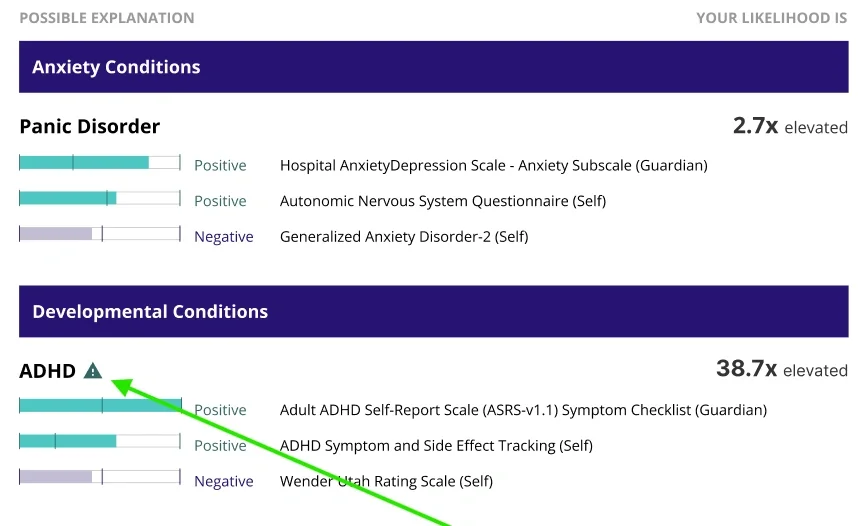New: Subtle ADHD Malingering Screener (SAMS) in MindMetrix

Built-in check for ADHD assessment integrity
August 13, 2025 | Jillian Fortain, Ph.D., LP, NCSP
Self-report is essential for understanding ones’ mental health experience, but it isn’t infallible. Some patients unintentionally over- or under-endorse symptoms; a minority may exaggerate symptoms to seek stimulants or accommodations. To improve assessment integrity when ADHD is tested, MindMetrix now administers the Subtle ADHD Malingering Screener (SAMS) automatically.
What SAMS is
SAMS is a brief, 10-item self-report screener developed to flag response patterns that are statistically more consistent with feigned ADHD than with genuine presentations or non-ADHD controls. In its initial validation study using participants previously diagnosed with ADHD, healthy controls, and instructed malingerers, SAMS achieved sensitivity of ~90% and specificity of ~80% for distinguishing simulators from the other groups (Ramachandran, et al., 2019). For MindMetrix, we’ve set the cut score to prioritize specificity over sensitivity, so that when a flag appears, you can be confident it carries meaningful weight and is worth investigating further.
How MindMetrix uses it
- When ADHD meets or exceeds our initial symptom screen threshold in adult patients (18 & over), MindMetrix appends SAMS to the individualized test set flow.
- Results appear as a SAMS Integrity Flag with brief interpretive text to support next steps.
- The goal is not to label intent, but to prompt additional verification when responses look atypical for bona fide ADHD. (This aligns with literature emphasizing that validity checks complement, not replace, clinical judgment.) (Ramachandran, et al., 2019; Skeel et al., 2022).
How to interpret
- Clear: No significant atypical feigning-consistent pattern detected. Proceed with usual diagnostic synthesis.
- Caution: Treat as a verification cue, not a diagnosis of malingering. Clinical judgement and consideration of collateral history, records review, and/or structured interview is warranted.
Important limitations
SAMS performance estimates come from research designs with instructed simulated malingerers, self-reported previous ADHD diagnosis, and no-diagnosis controls; external validity can vary across settings (e.g., non-student clinics, forensic contexts). It should not be used in isolation to make a determination about intent. Further research is needed to clarify relationships with stimulant misuse/diversion in broader, real-world samples (Ramachandran, et al., 2019).
SAMS adds a fast, evidence-based validity checkpoint to MindMetrix’s ADHD assessment pathway. It won’t “prove” malingering, but it does help you spot when self-report warrants closer scrutiny, so you can make better-supported decisions in complex cases.
Ready to boost your practice?
Try 3 complimentary assessments on us.

